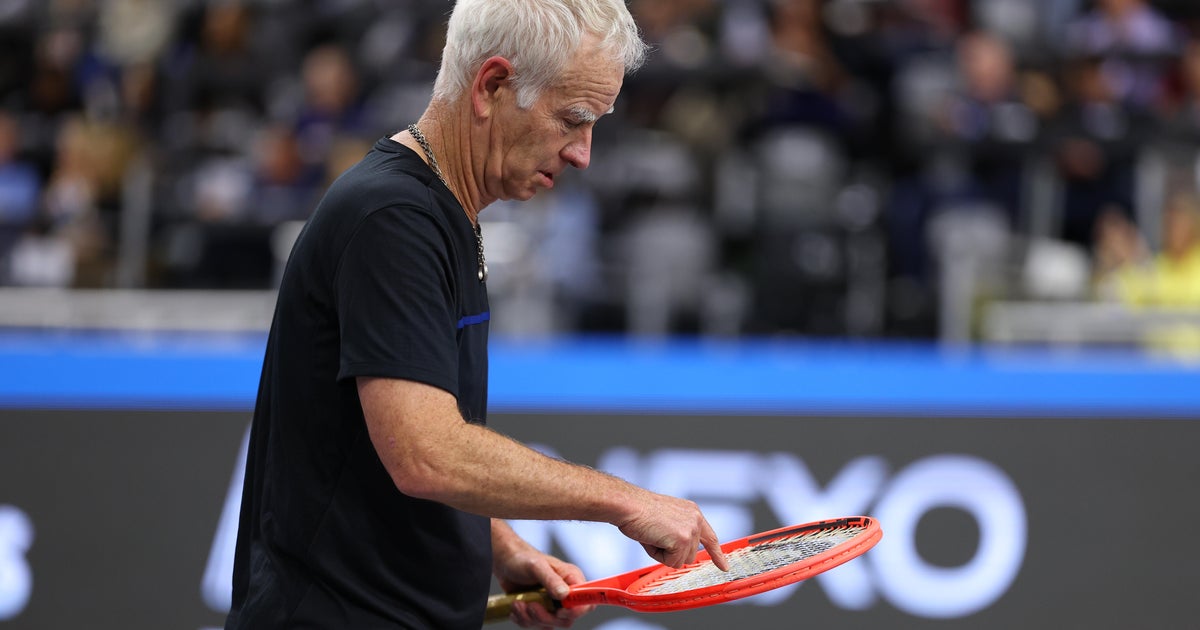J.K. Rowling, others blast "racist" Serena Williams newspaper cartoon
A white cartoonist's depiction of Serena Williams breaking her racket during the U.S. Open final — which led to one of the three controversial penalties she received before losing the match to Naomi Osaka — sparked widespread backlash on Monday. Author J.K. Rowling was one influential voice who weighed in on the polarizing illustration, calling the cartoon "racist" on Twitter.
The image, drawn by Mark Knight for Australia's Herald Sun newspaper,shows the cartoonist's version of Williams, stomping on her racket and appearing to cry after spitting out a pacifier. The cartoonist essentially reduced the 23-time Grand Slam singles champion to a big "cry baby."
In the background of the cartoon, Knight drew Williams' opponent. Osaka is depicted as a tall, slim, blonde woman, looking up at the referee, as he asks her "Can you just let her win?"
In Knight's cartoon, Osaka, who has dark, curly hair in real life, appeared small compared to Williams, despite being two inches taller in real life.
Osaka is the first Japanese player to capture a singles Grand Slam title. The 20-year-old defeated Williams -- consider by many to be the greatest tennis player of all time -- in two sets on Saturday. Williams did get emotional during the match while defending herself against chair umpire Carlos Ramos.
Ramos gave Williams three warnings during the final, one of which was for smashing her racket, automatically costing her a point. At one point, Williams called Ramos "a thief," which drew a violation for "verbal abuse" and cost her a game, putting Osaka ahead 5-3.
"I have never cheated in my life!" Williams told Ramos. "You owe me an apology." Williams was fined a total of $17,000 for the three violations.
Many people saw problems with the cartoon and expressed concerns over its inaccurate and inappropriate depiction of both female tennis players.
"Well done on reducing one of the greatest sportswomen alive to racist and sexist tropes and turning a second great sportswoman into a faceless prop ," Rowling tweeted on Monday, referring to Knight's caricature of Williams and Osaka, respectively.
Knight defended the cartoon in a reply to another user. "Don't bring gender into it when it's all about behaviour," he wrote, pointing to a cartoon he drew depicting a male Australian player.
This is not the first time Rowling has used Twitter to defend Williams. In 2015, when a man tweeted that the "main reason for her [Williams'] success is that she is built like a man," Rowling responded with photos of Williams in a red dress, writing, "'she is built like a man'. Yeah, my husband looks just like this in a dress. You're an idiot."
Rowling wasn't the only person to defend Williams after Knight shared his cartoon on Twitter Sunday. Pam Keith, the Democratic candidate for Florida's 18th Congressional District, also called the cartoon "racist," saying that to her, a black woman, "it was a punch in the gut."
Several Twitter users pointed out that not only was the "cry baby" Serena offensive, but Knight's caricature of Osaka, who is of mixed Japanese and Haitian descent, was grossly inaccurate, too. "What a disgraceful depiction of both Black women. One to show as a crazed animal the other to show as 'pure as a blond white girl.' This is so offensive!" on Twitter user wrote.
The cartoon that many deemed sexist and racist seems to underscore Williams' treatment during the final match, as well as the treatment she has received throughout her career. Many people saw the code violations issued by Ramos as a double standard — penalties that he readily handed Williams, but that have not been applied to male tennis players in the past.
Williams argued with Ramos, trying to defending herself against the referee's calls until he deemed it "verbal abuse." Male players who do the same thing are often excused, even celebrated on the tennis court. Williams continued to defend her actions after the match, saying at a news conference: "You definitely can't go back in time, but I can't sit here and say I wouldn't call him a thief again because I thought he took a game from me."
Instead of a celebration, Williams was the subject of an offensive cartoon that critiqued her physical appearance, mocked her demeanor and diminished a match that she fought so hard to win but ultimately lost to another outstanding black woman.



